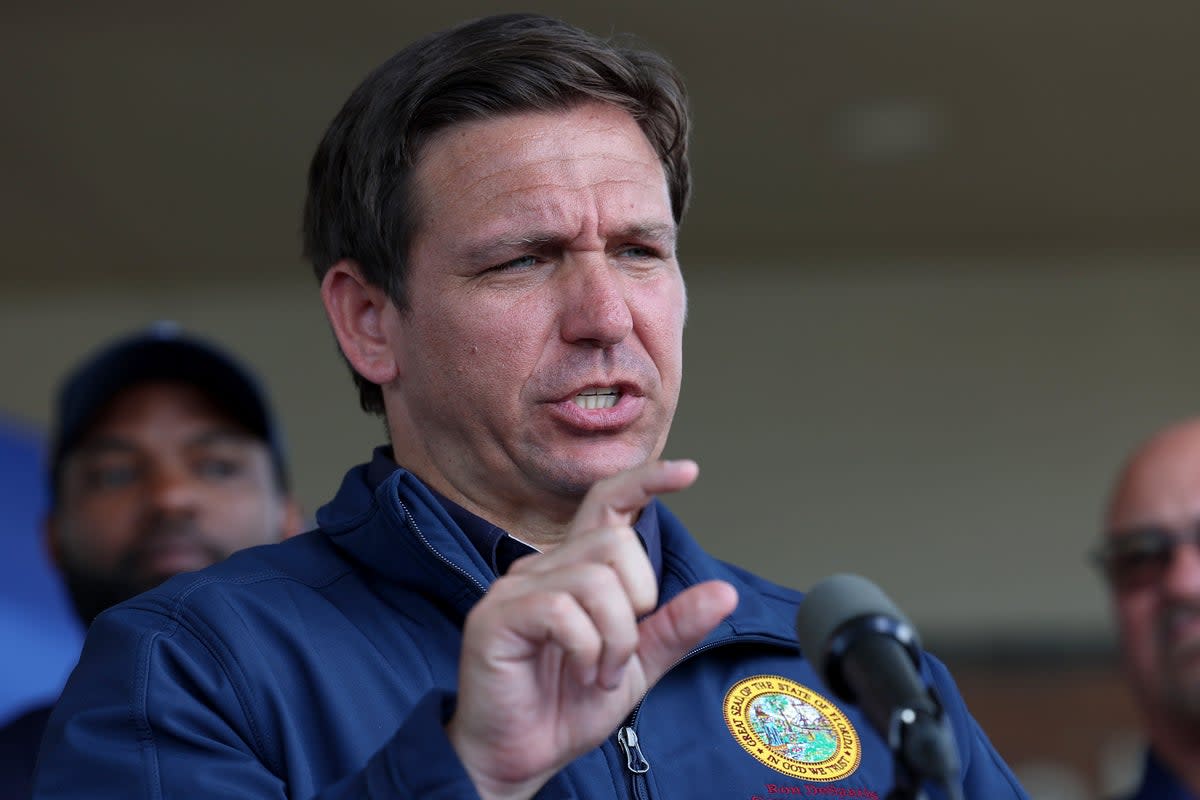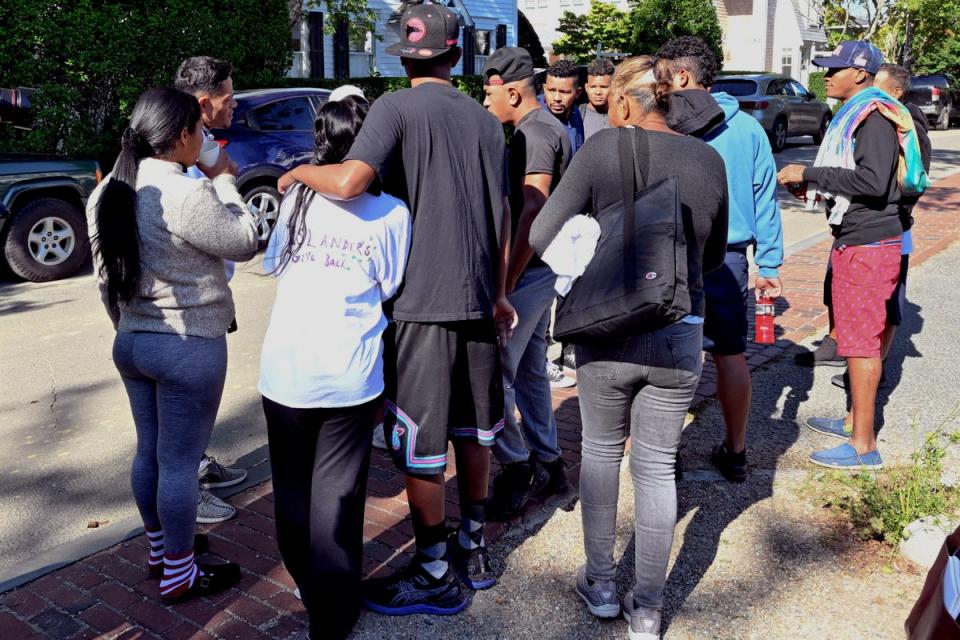Statesman or culture warrior - Who is Ron DeSantis this week?

- Oops!Something went wrong.Please try again later.
- Oops!Something went wrong.Please try again later.
- Oops!Something went wrong.Please try again later.
There is a clip of Ron DeSantis being interviewed on CNN that is really worth taking a look at.
It is not that clip - the angry, aggressive hectoring of a reporter back in January 2021 when she asked why the vaccine roll out in Florida appeared to be going quite slowly.
Rather it occurred his week, when in the aftermath of Hurricane Ian that had left more than 100 people dead, he was asked about whether the evacuation orders had got out to places such Lee County quickly enough.
The governor certainly starts to snap at the question - “Where was your industry station when the storm hit where you guys in Lee County? No, you were in Tampa” - but he quite quickly changes to defending his actions in a measured way.
“You know, everybody had adequate opportunity to at least get to a shelter within the county. But a lot of the residents did not did not want to do that. I think probably for various reasons,” he says, explaining how the forecast had suggested Tampa, where the media had stationed itself, was most likely to be hit.
There is another press conference that is crucial to watch to get an understanding of the 44-year-old Republican governor, first elected in 2018, who is seeking to secure a second term in November’s midterms.
That took place just a few days before the storm struck, when Mr DeSantis was defending what many critics and human rights activists had denounced as a political stunt, using real people. In a move that appeared designed to his base voters, Mr DeSantis used Florida state funds to fly to Texas, collect up to 50 Venezuelan asylum seekers detained by the Texan authorities, and fly them to Martha’s Vineyard, a luxury island off the coast of Massachusetts.
The message to liberals was clear: If you’re so keen to declare yourselves “sanctuary cities”, how about we fly you some migrants directly, regardless of whether you have the resources to handle them, or regardless of whether those people seeking to escape desperate straits back in Venezuela, were lied to?
“Nobody can deny that there’s a crisis. Everybody now knows,” he said. “I think it’s opening people’s eyes to the solution.”
He added: “I don’t hear outrage about the criminal aliens that have got through and have victimised people.”
So what are people to think?
As the nation prepares for the midterm elections which could see DeSantis secure another term that he could use as a platform for a White House run for if he so wishes, what has he been trying to do in these recent days.
Is he the would-be statesman, preparing to welcome Joe Biden to Florida and thank him for the many millions of dollars set aside by the Federal Emergency Management Agency (FEMA), even though when he was a member of Congress, he voted against spending federal money when Hurricane Sandy struck the New York region in 2012?
Or is Mr DeSantis the hard-knuckled conservative willing to clash with everyone from teachers unions to Disney, sign into law legislation restricting how race, sexual orientation and gender identity can be discussed in the classroom, and fly migrants to Martha’s Vineyard?
“I think [the hurricane] gave him an opportunity to soften his image with voters,” says Professor Todd Belt, of George Washington University.
Mr Belt, a political scientist who heads the university’s political management programme, tells The Independent that when natural disasters occur, it is up to elected officials to provide, assistance “without favour”.
“He’s really signaling to people that he’s doing that and taking his job seriously and that’s quite in contrast to somebody like Donald Trump, who didn’t want to provide forest fire aid for California, because they did not vote for him,” he says.
That not only distinguishes himself from Mr Trump, but also from a recent avatar of himself - the one who sent migrants to Massachusetts. “He is trying to shift the narrative in that way.”
For a state’s governor, responding to a natural disaster and securing a close - but not too close - relationship with the White House can be be a careful path to tread. It can also be tricky for a president, particularly one from a different party.

Democratic President Barack Obama and Republican Governor Chris Christie of New Jersey managed to work pretty effectively together when Sandy devastated parts of New Jersey. Republican critics of Mr Christie will say he worked too closely, given Democrats happily made use of footage of their appearances together in his reelection campaign later that year. It was a contest he eventully won 51- 47 against Mitt Romney.
In 2005, both Republican President George W Bush and Louisiana’s Democratic Governor Kathleen Babineaux Blanco fared poorly in the aftermath of Hurricane Katrina that killed more than 1,000 people. Mr Bush was accused of being distant, and was attacked for flying over the city of New Orleans by plane rather than setting foot on the ground.
There were accusations of racism, and claims that the administration would not have responded so haplessly had the city’s population not been made up so much of people of colour and the poor.
Ms Blanco said the state’s despair was made worse by a White House eager to blame someone else for its failed disaster response: “I just thought I could shout more loudly than the noise around me, but in the end I couldn’t. There was just too much pain,” she said.
She did not seek reelection and died in 2019 after contracting cancer.
Mr Trump received poor marks from everyone but himself when Hurricane Maria struck Puerto Rico in 2017, killing more than 3,000 people. Mr Trump was accused of failing to respond either quickly enough or at a big enough scale.
A report in 2021 by the Housing Department’s Office of the Inspector General found the Trump administration delayed more than $20bn in hurricane relief aid for the island.
Mr Trump clashed repeatedly with the mayor of San Juan, Democrat Carmen Yulin Cruz.
“The Trump administration killed Puerto Ricans with neglect,” she later said. Speaking to CNN, she added: “The Trump administration led us to believe that they were helping when they weren’t really up to par.”
Mr DeSantis and Mr Biden have vowed that they are working together for the benefit of Floridians.
While the Republican frequently attacked Mr Biden in the weeks and months ahead of the storm, his rhetoric shifted just before Ian hit.
“When people’s lives and their property are at risk like this, we all need to work together regardless of party lines,” Mr DeSantis told Fox News. “The Biden administration has approved our request for a pre-landfall declaration and did that very quickly, so we are very thankful for that. And it’s my sense that the administration wants to help.”
In Washington DC, Mr Biden sent similarly warm words, very much aware that with just weeks before the midterms, Democrats need to be able to project themselves as party that can get things done.
The president was asked about his relationship and conversations with the governor when he spoke at FEMA headquarters.
“It’s totally irrelevant, but I’ll answer it, OK?” he repied.
“Very fine. He complimented me, he thanked me for the immediate response we had. He told me how much he appreciated it. He said he was extremely happy with what’s going on.”
Richard Conley is an associate professor of political science at the University of Florida in Gainesville. He says there are always political considerations when natural disasters strike.
He believes from what has played out so far, both the White House and the governor’s office in Tallahassee, will have been pleased with the way the two men have been able to work together.
“I think this is a time when both Biden and DeSantis can look statesmen-like and above the fray,” he says.
“You know, the important thing is to get the water, the electricity, the resources back.”
He adds: “At this juncture, it really becomes kind of an administrative deal where the administration, meaning the gubernatorial administration has to try to coordinate with FEMA. And the not for profits.”
The danger for Mr DeSantis is that if things are not repaired quickly people can look for people to blame. “And that may not be any fault of his own,” he says.
Others have a more critical take on Mr DeSantis’s actions.
Adriana Rivera Sanchez is communications director for the Florida Immigrant Coalition, a Miami-based group working to help migrants to the US.
“Governor DeSantis is an extremely politically savvy governor. He knows how to play to his strengths,” she says.
“He is using this moment to the sympathiser, the person who’s there for you, as he should as a governor honestly.”
For months Mr DeSantis may have been criticisng Mr Biden but realizes he now need his help
“Politicians like the Santas and Greg Abbott in Texas have been using culture war issues as their campaign. That is what happened with sending the migrants to Martha’s Vineyard,” Ms Sanchez says.
“They’re using immigration, and they’re vilifying people that are looking for opportunities, just like his great grandparents, who all came from Italy.”
Does she think Mr DeSantis has genuinely changed with this week’s display of concern?
“He has no regard for people. He’s shown that. It’s like I say when when someone shows you who they are, believe them the first time,” she says.
“He needs the funding for hurricane recovery. However, he’s using $12 million of Floridians taxpayer money that was actually earmarked for Covid relief and he’s using it to traffic people across state lines.”

